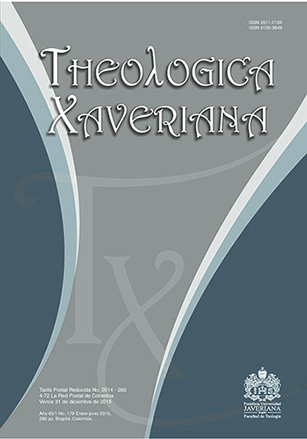Abstract
It approaches the hymn of Yahveh, in Is 42,8-9, from the interpretative sciences, in order to suggest its current relevance for Ecology. Reading this text, in the light of its position in Isaiah, its poetic techniques and its diachronic development, proves the current strength of a new ecological reading of the hymn. The application of the speech act theory as a speech act enables the reading community to associate the strength of the text with today’s eco-justice mission. This consists –according to the hymn– on resisting the ideology of static religion, caring for the environment and reinterpreting the ecoeschatological hope.
This journal is registered under a Creative Commons Attribution 4.0 International Public License. Thus, this work may be reproduced, distributed, and publicly shared in digital format, as long as the names of the authors and Pontificia Universidad Javeriana are acknowledged. Others are allowed to quote, adapt, transform, auto-archive, republish, and create based on this material, for any purpose (even commercial ones), provided the authorship is duly acknowledged, a link to the original work is provided, and it is specified if changes have been made. Pontificia Universidad Javeriana does not hold the rights of published works and the authors are solely responsible for the contents of their works; they keep the moral, intellectual, privacy, and publicity rights.
Approving the intervention of the work (review, copy-editing, translation, layout) and the following outreach, are granted through an use license and not through an assignment of rights. This means the journal and Pontificia Universidad Javeriana cannot be held responsible for any ethical malpractice by the authors. As a consequence of the protection granted by the use license, the journal is not required to publish recantations or modify information already published, unless the errata stems from the editorial management process. Publishing contents in this journal does not generate royalties for contributors.


